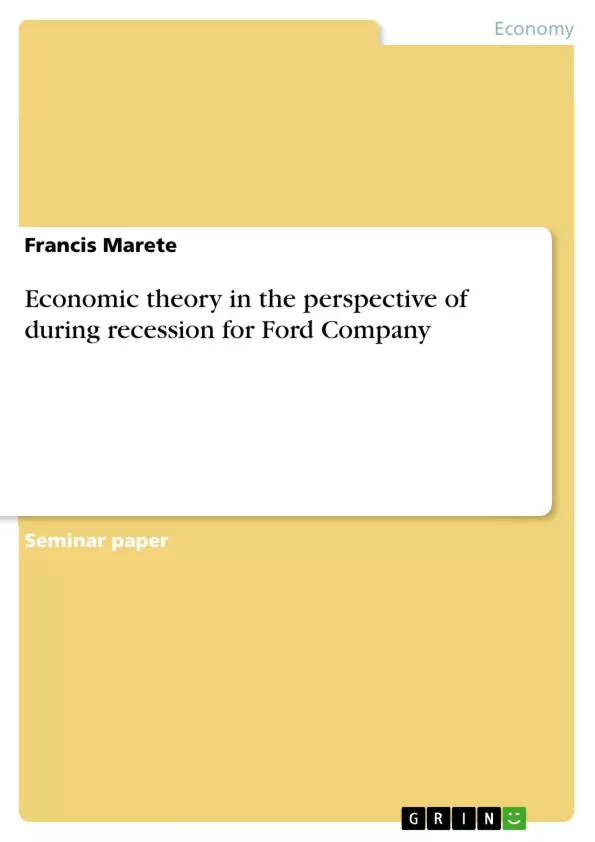This paper presents and discusses the Ford scenario in recession in the perspective of business economic theory. Economic theory is a broad concept for the explanation of the movement of goods in a market. Theoretical economic concepts have scientific backing or studies to prove or disprove a stated speculation. National governments also have an interest in theories of economics. Politicians swear on studies of government spending, money supply, tax collections, and consumer spending data to make laws or set policy. Dissimilar economic theories exist that focus on different aspects of government policy perspective economics. (Salvadori 2003)
Ford Motor Company was shaped on superior products and that exists today. They have an exceptional line of trucks and cars which ranges from the Model-T to today’s Ford Focus and F-Series, the excellent selling car and truck in the world. Their current product line is the strongest in their history and is getting stronger yet. (Collins 2007) This year they added the new Ford Explorer, Expedition and Thunderbird in North America, the new Lincoln Blackwood, Ford Fiesta in Europe and Navigator, Land Rover Freelander and Range Rover, Aston Martin Vanquish, Jaguar X-Type, Mercury Mountaineer, and the Mazda Sport Wagon. These vehicles will help to separate them from their competition. (Rosenberg 2012)
Inhaltsverzeichnis (Table of Contents)
- Economic theory in the perspective of during recession for Ford Company
- Scenarios about the microeconomic and macroeconomic
- Moving from Micro to Macro
- Good or services in concern with price and income elasticity
- Market structure and possible strategy
Zielsetzung und Themenschwerpunkte (Objectives and Key Themes)
This paper examines the economic implications of a recession on Ford Motor Company, applying theoretical concepts from micro and macroeconomics. It explores how these theories play out in the real-world scenario of a major automobile manufacturer facing an economic downturn.
- The influence of economic theory on business strategy during a recession
- Microeconomic concepts such as supply and demand, and their impact on Ford's operations
- Macroeconomic factors affecting the automobile industry, including inflation and economic growth
- The role of price and income elasticity in consumer behavior during economic downturns
- Market structures and their impact on Ford's competitive strategy
Zusammenfassung der Kapitel (Chapter Summaries)
- This chapter introduces the paper's objectives and outlines the theoretical framework used to analyze Ford's situation during a recession.
- The chapter explains the concepts of microeconomics and macroeconomics, and how they apply to the automobile industry. It uses examples to illustrate how changes in demand and supply affect the pricing and production of cars.
- The chapter explores the connection between micro and macroeconomics, demonstrating how individual market dynamics can impact the larger economy. It also discusses the factors influencing consumer demand, such as income levels and price sensitivity.
- This chapter examines the relationship between price and income elasticity and consumer behavior. It highlights how these factors can affect Ford's pricing strategies during a recession, emphasizing the need to understand consumer purchasing power and preferences.
- The chapter explores the market structures within which Ford operates, analyzing the implications for its competitive strategy. It emphasizes the importance of differentiating products and adapting to changing consumer needs in a dynamic market environment.
Schlüsselwörter (Keywords)
This paper focuses on the economic implications of a recession on Ford Motor Company. Key concepts include microeconomics, macroeconomics, supply and demand, price and income elasticity, market structures, and competitive strategy.
Frequently Asked Questions
How does economic theory apply to Ford Motor Company during a recession?
The paper applies micro and macroeconomic concepts to analyze Ford's strategy, production, and pricing decisions when facing an economic downturn.
What is the difference between microeconomics and macroeconomics in this context?
Microeconomics focuses on individual market dynamics like supply and demand for specific vehicles, while macroeconomics looks at broad factors like inflation and national consumer spending data.
How do price and income elasticity affect car sales?
They measure how sensitive consumers are to changes in car prices and their own income levels, which is crucial for Ford to understand during a recession to set competitive prices.
Which Ford products are mentioned as historically significant?
The paper mentions the Model-T, the Ford Focus, and the F-Series trucks, noting that Ford's strength lies in superior products.
What strategy does Ford use to separate itself from competition?
Ford focuses on maintaining a strong and diverse product line, including models like the Explorer, Expedition, and Fiesta, to differentiate itself in the global market.
Why are government spending and tax collections relevant to Ford?
Governments use these economic indicators to set policies that influence consumer purchasing power, which directly impacts the automobile industry's health.
- Quote paper
- Francis Marete (Author), 2012, Economic theory in the perspective of during recession for Ford Company, Munich, GRIN Verlag, https://www.grin.com/document/278576



